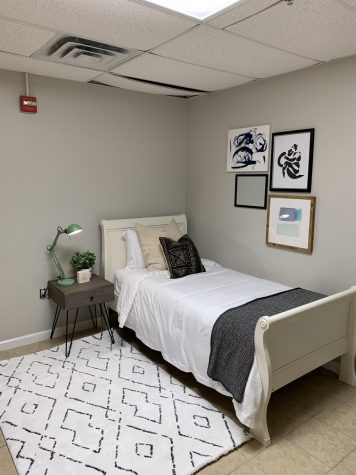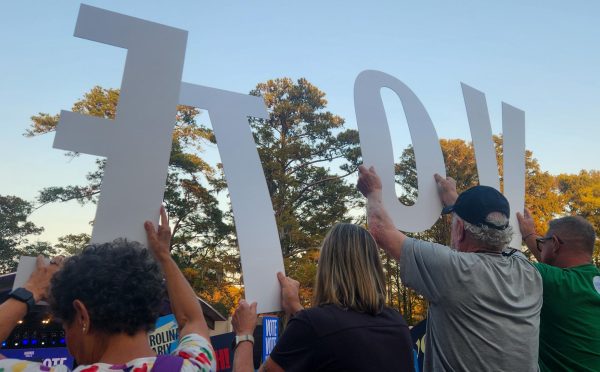511 House provides space for human trafficking victims
According to the North Carolina Department of Administration (NC DOA), human trafficking is one the fastest growing crimes in the United States. In 2019, North Carolina ranked 11 in the nation for the number of cases reported.
Since 1998 First Fruit Ministries has served as a place for women and other marginalized communities to live, recover and heal through various programs.
Now in 2021, they are expanding their programming to further help women rescued from human trafficking through the 511 House.
Over the next three years, First Fruit Ministries will receive half a million dollars in funding. They are one of about 73 organizations that received a federal grant through the Office for Victims of Crime.
This new grant is specifically for transitional housing for victims of trafficking. Due to this funding, they were able to create a more robust version of programs they have been offering since the early 2000s.
“511 House is a crisis response housing that has two components to it,” said Lee Anna Stoker, the Executive Director of First Fruit Ministries. “The first part is transitional housing, and that’s up to six months. The second part is rapid rehousing. The way the Department of Justice does it is that you get six months of transitional housing, and then you get first month’s rent and deposit at exit to move you into your permanent place. We help you make that last step. We do it in two ways. So we have a recovery model and a harm reduction model so you get to choose as a client, where you want to fit into things.”
Along with this grant came several stipulations. For example, the grant has to have a 25% match. So, for every 75 cents of money received and used from the grant, First Fruit Ministries has to spend 25 cents of their own money. This match is usually covered by their handful of private donors.
In addition, the grant cannot be used for construction, decorations or to pay their on-campus mortgages.
“So I can’t pay rent to myself on a building that I own,” said Stoker. “I can either rent a place in town for a client and pay that landlord their rent, or I can pay like the utilities, and so forth, for people who live on our campus. But I can’t pay my mortgage for the people that live on-campus, which creates a challenge, because that means that you have to go find the mortgage payment somewhere else. So that’s probably the most significant thing is that with federal dollars in particular you can’t pay your mortgage principal.”
First Fruit Ministries and their 511 House provides more than just free housing to their clients. They provide several other free services as well.
“So you would get engagement and outreach services before you ever even became a client at the house,” said Stoker. “Once you’re in, we have full primary medical care. We have a doctor on campus. We have behavioral health, so you will get a clinical assessment and mental health care, you would get trauma-focused therapy very specific for trauma survivors with this sort of profile, and you get your meals, groceries, toiletries and laundry.
“And we have a life coach who works in the house, who works with folks to practice a lot of the life skills. You get full case management and you get transportation. We [also] have a whole rec program, [where] we go to the Carolina Beach [pier area].”
They also train people for their full mentorship services. Mentors receive trauma-informed care and then are paired one on one with a resident.
“One of the things about poverty is that it’s socially isolating, you don’t know anybody that you can call in a crisis,” said Stoker. “And so, one of the barriers that you have to break through when you’re changing out of the life you were in, to where you’re going to is you need to meet new people, you need new friends. The mentorship program is about starting that and I think it’s as significant as the free medical care.”
On their campus, there are currently 18 beds for all the various programs their organization offers. However, eight of those on-campus beds are specifically for the 511 House. Additionally, they have two other units that are scattered off-site.

Clients began applying as soon as news broke that First Fruit Ministries received the grant. Clients have to go through an application process to make sure they meet the requirements. People who show up directly at First Fruit Ministries are first sent to an emergency shelter since their organization deals with more of the transitional phases for these people.
They plan to hold a big provider workshop near the end of the month to help people learn how to apply and how their application is viewed. Their applications also include a screening process.
“It’s something that helps us identify is this person a victim of trafficking,” said Stoker. “You can be a victim of a very unfortunate circumstances and not necessarily be a victim of trafficking, right, and we have other programs for that. But this house is just for trafficking victims.”
Stoker said the best way to get involved with First Fruit Ministries and or the 511 House program is to visit their website and click the volunteer tab.
There are various levels of involvement that people can volunteer for depending on their availability and how comfortable they feel committing to their organization.
“When it comes to the things that really authentically matter, reaching out to people who are trapped and who are in pain, in a lot of ways, and just loving them where they are, walking with them, and being a guide,” said Stoker. “And every time they wander off, that’s totally fine. We’ll go out and find you and when you want to come back this way we’ll go do that. Just being the guide and doing it in a way that’s like no matter what choices you make, whether I agree with them or not, I’m still here for you all the time. [That] is everything that we’re about truly.”
To report human trafficking, you can call or text the National Human Trafficking Resource Center at 1-888-373-7888 or “BEFREE” to 233733.









